Could you give a brief history of communism in Wales?
The timeline of socialism and the working class in Wales makes for a rich reading, one that is often hard to condense into a short paragraph.
In 1907, Keir Hardie, a Member of Parliament for Methyr, spoke openly on the natural-born connection between Wales and socialism. A hundred years ago many Welsh people could heavily grasp the rage and might that had led to revolution in Russia. They had suffered extremely poor conditions, wrongs, and injustices within industry – the oppression from the masters, the bourgeoisie. As the industrial revolution swept across Wales, it quickly gave rise to working class communities which would go on to become hotbeds of socialism. In the south, works and coal mines were sunk in the earth; while in the north-east a booming slate industry developed.
Jack Jones, a miner attended the founding conference of the British Communist Party in 1921, as the delegate from his home of Pontypool. He wrote in his autobiography upon returning to Wales that he was going to “play [his] part in the class war.” This however was short lived; he soon left to join the Labour Party, and eventually the Conservatives. This had left a divide, miners disillusioned – others empowered.
Lewis Jones, another miner, maintained his faith in the Russian revolution. In his short story The Power of the Pit, he wrote: “Red was the colour of the blood they lost. Red is the colour of the revolution they will make”. The purpose of his other novels Cwmardy and We Live was to further the possibility of bringing Communist revolution to Wales.
Whilst electorally less prevalent, the Welsh Committee of the Communist Party of Great Britain was a consistent feature of Welsh politics in the 20th century, primarily in the influence of worker’s rights in trade unions.
In 1929, Aneurin Bevan became a Member of Parliament for Ebbw Vale. Known for bridging the more revolutionary Marxist tradition with social democracy, the most defining act of his career was the foundation of the National Health Service during his tenure as Minister for Health in Clement Atlee’s post-war Labour government. While occasionally critical of Welsh nationalism, his influence can be seen in what eventually led to the establishment of the Welsh Office in 1964, and the long journey thereafter towards devolution.
Raymond Williams, from the small village Pandy, was a more traditional scholar of the New Left movement. He placed great emphasis on the importance of renouncing the oppressive structures of the capitalist state, and touted the importance of identity, women’s equality, and the recognition of the activity of minorities and people of colour. He was one of the first figures to speak on the British state’s opposition to progressive socialism in Wales, a lead followed by such figures as Robert Griffiths and Gareth Miles, founders of the Welsh Socialist Republican Movement in the 1980s. The WSRM were primarily responsible for popularising Marxist ideas amongst Welsh communities.
Outside of direct political spheres, rioting, community organizing, and protest have been consistent among the Welsh people and their fight for workers rights. In 1831, a violent uprising, which has come to be known as the Methyr Rising, broke out among the large working-class population in Merthyr Tydfil. The miners called for reform that would stop the lowering of their wages and reverse stagnant employment rates. It is believed that the Rising saw the first raising of a red flag as an explicit symbol of workers rights.
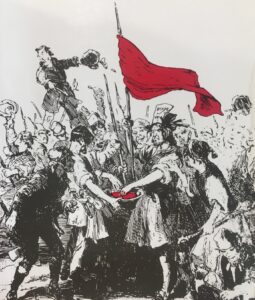
In 1839, The Newport Chartists began agitation that would continue right up until the 1850s. The movement focused on a charter which aimed to reform the British electoral system: introducing votes for all men aged over 21, equal electoral districts, payment of MPs to allow working class men to stand, anonymous ballots, and annual elections (which before then stood every 7 years and created a large divide between politicians and working-class people.) The ‘Rising’ at Newport in November 1839 was the most serious manifestation of physical force Chartism in Britain, a true story of rebellion. Chartism and its calls for democratic rights for workers allowed for the development of a political consciousness in Wales, leading to the Rebecca Riots, a movement against toll gates in the Welsh countryside, which fought against the more general decline in economic conditions in the area until 1843.
Miners strikes became a common occurence during the 20th century, becoming the flashpoints of confrontation between organised labour and state power in Wales.
In 1900, following years of unrest among workers in the Ogwen Valley, a strike was called by the mine workers employed by Lord Penrhyn. The community was torn apart by the strike, with some accepting a 5% pay increase and immediate advance pay of one shilling (which became known as the “Tail pound”) to betray their colleagues. Those who continued on the strike erected posters in the windows of their homes declaring: “Nid Oes Bradwr yn y Ty Hwn” (“There is No Traitor in this House”),
A more violent confrontation occured at Cambrian Combine in October 1910, as miners refused to accept a new lower pay offer, opting instead to go out on strike. Violence broke out as the strikers stopped other miners from crossing the picket, with the resulting bitterness leading to riots in Tonypandy. The inevitable clash between picketers and strike-breakers materialized at Llwynypia. Miners and police fought hand-to-hand, as the strikers pelted the pit’s powerhouse with rocks.
The decisive clash of the last century occured upon the announcement of pit closures across Britain. The government escalated violence between 1984-1985, transporting and utilising overwhelming police and military force. The communities on the receiving end of this violence continue to bear the scars and often channel them into solidarity with workers worldwide.
To conclude, the fight against fascism in Spain between 1936 and 1939, drove young men and women from all over Wales to cross the Pyrenees. The similarities between the plight of Catalonian and Basque nationalism with their Welsh counterpart was especially encouraging. The response in Wales was largely provided by the South Wales Miners’ Federation and the Communist Party and eventually supported by a broad coalition including the Labour Party, Liberals, some Welsh writers, academics, and teachers. Some became famous in later life as trade union leaders, notably Will Paynter and Twm Sbaen.

In 1974, the Trade Union Congress Cymru was formed. It continues to spearhead campaigns for worker’s rights throughout Wales. The fight for greater workplace equality in Wales has never ceased, and its Communist roots are visible to those who want to see them.
What does socialist-republicanism mean in a Welsh context? i.e. Why is an independent Welsh socialist republic necessary?
Wales is the poorest nation of the UK, and the one that has experienced the bitter reality of Westminster’s class warfare over the centuries on mainland Britain.
From Imperial annexation, to the draining of our resources, the ‘most entrenched class system’ of any nation, that of England, continues to dominate in Wales.
We face many challenges, such as continuous and blatant bias from the British media establishment, already owned by just five billionaires, as well as the limits of the UK electoral system (one election every four years, maybe two or three if you live in Wales, with Welsh votes represented by just 50 MPs, compared to England’s over 500), We consistently witness the continued exodus of our young and skilled, all the while Wales is advertised as a playground for retirees. Independence is needed to preserve Wales as a nation, and to free it from its status as a vassal state of English capital.
However, we do not want independence for the sake of it, and categorically reject the support of independence for its own sake.
As Marxists, we advocate for a Welsh independence based on socialism, similar to how James Connolly fought in Ireland; to do so would strike a hard blow, not only at capitalism in the UK, but at the imperialist system which it gleefully partakes in.
When we advocate for socialism, we advocate for a radical change to the economy and political culture of Wales, with an economy re-orientated to serve the people, not line the pockets of the rich. If we were to achieve independence without socialism, it would mean the classes that lower wages, raise rents, remove benefits, defund our communities, and cut services would be Welsh, and would rule from Cardiff instead of Westminster. When we advocate for socialism, we advocate for the truest sense of democracy: the right of workers to have their just say in their life, their society, their economy, and their country.
In contrast to other socialist groups, we believe that Welsh independence would not weaken working-class solidarity in the UK (as the exit of the EU did not weaken working-class solidarity across Europe). In order to fight for socialism in the UK, we first need to get our own house in order, and return to the fight alongside Scotland and England as equal partners, not an underdeveloped nation dragged along by our English and Scottish comrades. The unity of the British state and the unity of the working class are not the same thing. Unity between workers in Scotland, England, Ireland, and Wales, does not rest on the maintenance of the British state or the capitalist interests it represents. The necessity for Welsh workers to unite with their brothers and sisters in England, Scotland, or Ireland will not evaporate in the face of a Welsh Socialist Republic. Workers from different countries can and do organise together across borders, in the same trade unions and in alliance against the same unscrupulous multinationals.
On the other hand, allying with the Tories, Liberal Democrats, and Labour to preserve the bosses’ state will damage workers’ unity. Part of maintaining workers’ unity is for English, Scottish, and Irish workers to support a potential Welsh vote for independence. However packaged, the no camp inevitably rallies forces to the Union Jack and the reactionary and backward ideas it stands for.
How influential is Irish socialist-republicanism for Welsh socialist-republicans? How do our nationalisms differ?
Irish socialist republicanism is influential to us for a number of reasons. In Wales, while we may think we’ve been treated terribly by the English and British State, we have the example of Ireland across the sea to remind us of how lucky we have been in many ways.
Irish socialist republicanism is the closest example we can look to in Wales about how to fight for national liberation from the British state, whilst fighting for that liberation to truly revolutionise life in Wales – i.e., liberation from the shackles of capitalism.
While we are fighting for socialism in Wales, our struggle depends on removing the direct control the English State has on the national systems in Wales. In other countries, socialists fight for a revolutionary legal system, or the nationalization of banks. For us in Wales, we aren’t even at the stage where we have our own Welsh legal system, or even a Welsh bank; we rely on the Bank of England, and the English courts; paragons of virtue!
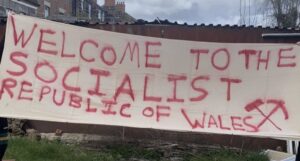
Many socialists view nationalism and socialism as two distinct political positions; most nationalists do too! In looking at Irish examples such as James Connolly, Bobby Sands, and Seamus Costello, we see people who have wedded these ideas, showing that they’re not only compatible, but necessary, and who have made the ultimate sacrifice in their pursuit.
Ireland provides a number of lessons and examples for Welsh socialist republicans. Perhaps unfortunately, Ireland provides an example in how nationalist politics without a socialist base will lead to working-class people suffering the most. Ireland is looked up to by many nationalists in Wales as a shining example of a ‘Celtic cousin’ who achieved their independence from Britain, and what this can look like in practice. For them, an Irish Eurovision Entry triumps the nearly 9,000 Irish citizens sleeping cold on the street.
What organisations (or events in Welsh history) inspire the WUN?
The WUN are lucky to have a great deal of inspirations across Welsh History. It was the Merthyr Rising of 1831, where the red-flag was flown for the first time in history as a sign of revolution.
From the Chartists spilling their blood in Newport and Merthyr in the fight against corrupt landowners and Iron-masters, to the widespread destruction of toll-booths by the Rebecca “Rioters”, to the hundreds of Welsh Communists who fought for the Spanish Republic, we have a lot to choose from.
At home, we have to look at the experiences of the Welsh Socialist Republican Movement of the 1980s, and learn from their successes, and of course the ultimate failures of the Organization.
Internationally, we’re inspired by the experiences of Socialists in fighting for National Liberation and the liberation of their Class – from Cuba, to Ireland, Burkina Faso, to Vietnam.
Primarily, our biggest influence would have to be the Black Panther Party. Such as with their “survival programmes”, the BPP’s direct community action serve as a model of how to best fight for Socialism – on the ground, in our communities, helping to build them up – encouraging solidarity, not charity!
How does the WUN relate to the wider Welsh nationalist movement? e.g. What is your relationship with Plaid Cymru?
As it currently stands, the WUN are the only active organization in Wales offering a Marxist perspective on the question of independence.
As socialists, we believe that independence is only worth having so far as it brings about a people’s republic.
To quote James Connolly, who puts it far better than we can;
“If you remove the English Army tomorrow and hoist the green flag over Dublin Castle, unless you set about the organization of the socialist republic your efforts will be in vain. England will still rule you. She would rule you through her capitalists, through her landlords, through her financiers, through the whole array of commercial and individualist institutions she has planted in this country and watered with the tears of our mothers and the blood of our martyrs.”
The WUN believes that independence for its own sake will do nothing to improve the lot of the Welsh working-class. It doesn’t matter whether it’s an English banker, or a Welsh business owner, ultimately a boot on your neck is a boot on your neck.
In that regard, we differ from the majority of Welsh nationalist organisations. For many other organisations currently active in Wales, a ‘broad-church’ approach is taken, aiming to unite people from across the political spectrum in supporting Welsh independence.
This may work in the short term perhaps, by promoting Welsh independence as a legitimate position, something deemed laughable even just a few years ago.
Ultimately however, this stance is completely unworkable. What would be the point of independence if it were to replicate the same right-wing imperial structures of the British state? Would there be any change? Of course not! It would be window dressing, and nothing else.
Independence in its very nature is the desire for extreme change, something completely incompatible with a ‘broad-church’, naively assuming that Marxist-Leninists, liberals, conservatives, and in many cases, ultra-nationalists could ever agree on what an Independent Wales would look like.
This in turn cripples any ‘broad-church’ campaign. For example in the YesCymru campaign, even the most simple issues, such as opposing austerity, or supporting the rights of transgender people, have led to incredible debate as to whether they breach ‘broad church’ guidelines. Ridiculous! Independence to fight the status quo, by preserving every aspect of it.
As for political parties advocating Welsh independence, primarily Plaid Cymru, our relationship with them is negligible for a number of reasons.
As Marxists, the idea that bourgeois political parties can ever achieve real gains for the working-class in Wales is a laughable concept. While Plaid Cymru may argue that they can offer real change, as has been shown time and time again in their various constituencies, and councils, they can be as ruthless as the worst of the Tories.
When the masses are at the gates, when it’s the choice between socialism, and preserving ‘liberal democracy’, would Plaid Cymru side with the working-classes, or with their pals in Labour, the Liberal Democrats, and the Conservative Party? We don’t think so. While there are some decent activists within the party, ultimately there can be no fundamental change whilst liberal parliamentary politics exists.
What is the WUN’s stance on the Welsh language and efforts surrounding its revitalisation? What efforts, if any, do you make to promote the language?
The WUN wholeheartedly supports the revitalization of the Welsh language as a unifying language of the proletariat, and reject chauvinistic attitudes within the British left to the minority languages as a barrier to class unification.
The Welsh language has a deeply radical history, from the language of the masses during the Merthyr and Newport risings to the successful direct action campaigns of Cymdeithas yr Iaeth to give equal recognition to the language. A complex combination of rural impoverishment, the second home crisis, and mass land grabs from the military, aristocrats and London businesses have led to a mass exodus of local Welsh speakers and an influx of middle-class retirees and landlords.
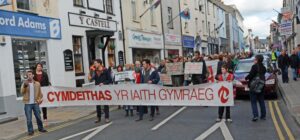
It is a testament to its speakers that it is still spoken today, centuries after its abandonment by the aristocrats and boudoirs, and as Marxist revolutionaries we must stand with the oppressed in all their forms, and Welsh speakers are no exception.
We have a way to go within the organisation. Business is overwhelmingly conducted in English, and bilingual statements and social media posts are minimal. However, we are making efforts to raise its status with a Welsh language working group, Welsh language podcast, and efforts to encourage Welsh learning in our membership.
The revitalization of Welsh will ultimately come from below, so it is our task to lead by example.
What are some of the main issues that you face as an organisation?
As an organisation, we’d say some of our biggest issues fall under one single category, and one that all socialists can attest to: manpower.
While we are growing almost daily, and have tripled in size over the last two years, we find that our relatively small numbers often limit what we would ideally like to be doing.

Because of those small-numbers, with everyone’s differing availability for on the ground-action, often a select number of comrades can be running a litany of different projects within the organisation. This is something we’re trying to limit, as we certainly don’t want comrades suffering with burnout.
Our demands are moderate: we only want the Earth. As a result though, it can often be the case that activists will give every drop of themselves to the cause, and suffer because of it. We have a long way to go, but we’re trying to daily to ensure our members don’t wear themselves out.
You could also argue that one of our biggest issues is ensuring our cause resonates with people, as to be a Welsh nationalist as well as a Marxist is something that hasn’t quite caught on with the majority opinion in Wales.
However, we believe in revolutionary optimism. Yes, we have a lot of work to do, but by adding even a single person to the cause, who knows the domino effect that will take place?
Of course, like all organizations, we have our own issues. It would be irresponsible to suggest otherwise. We’ve been wrong, we’ve had to stamp out uncomradely behaviour, we’ve made mistakes. To us, it’s the goal of the Marxist to constantly learn, and to make an effort daily to ensure we don’t repeat yesterday’s mistakes.
What are some of the most successful tactics that you employ as an organisation?
In terms of tactics, we believe that to effectively organize, we need to be on the ground, in the heart of our communities.
We believe that to achieve support, and persuade people to join the cause, we need to show how we help, not just preach. This is why our tactics involve ‘serve the people’ programmes, where working-class people in Wales can directly see the positive impact we can have on local communities.
We pride ourselves on our regular Supply Stations, where comrades will set up a stall in the centre of a local area, and provide free teas, coffees, sanitary items, and hot meals. Similarly, we conduct regular ‘community clear-ups’, where members will litter-pick, trim weeds, and generally clear a given area.
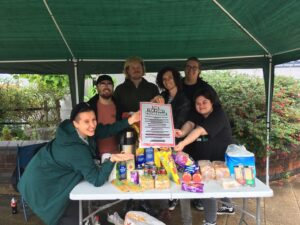
We have also found that holding genuinely engaging public events, such as gigs, politics and pints socials, and community barbeques have helped bring people into the fray.
We also believe in more direct approaches. Sticker-bombing, wheat-pasted posters, and leaflet drops have proved effective for us. Similarly, members participating in, or co-ordinating direct action campaigns have aided in our movement’s growth – such as the alleged participation of WUN Members in the Occupation of the Wrexham Solvay Plant on behalf of Palestine Action.
Ultimately, we’d simply boil down our successful tactics to this: the most important thing is getting out, and getting something done.
A lot of left-wing organisations on the island of Britain generally have a poor reputation when it comes to transphobia, the WUN seems to take the issues seriously, how does the WUN actively struggle against transphobia?
The Trans working group was the first established within the Welsh Underground Network, following a campaign surrounding the Gender Recognition Act.
Since then, we have made educational social media posts, including those in response to increasing transphobia from the media and within electoral political parties, and held a series of trans working group led book-club sessions within the organisation on The Transgender Issue by Shon Faye. We have also begun posting articles on our website exploring the more personal aspects of trans identity and living with transphobia that often get overlooked in the big political debates.
Going forward, we plan on continuing to post this kind of content. We are currently working on a trans working group episode of our Red Panic Radio podcast, as well as an article exposing the extent of transphobia within the Welsh independence movement.
We also hope to carry out more internal education on trans issues, to ensure that all comrades within the WUN are actively engaging with the struggle for trans liberation.
Similarly, many communist organisations, whilst being ostensibly feminist, can be lacking when it comes to addressing women’s issues. Does the WUN have any issues, and if so, how has it committed itself to combating misogyny?
The WUN has been dedicated to women’s issues from early on. We’re similar to many socialist organisations in having fewer women than men, and I think we may even have more non-binary members than women members!
We also have a young membership, which means that many traditional women’s issues, like equal pay and maternity/childcare rights (which are bread and butter to trade unionists) are lower on our agenda than they might otherwise be. They also feel a little out of reach to us. They’re such huge issues that require national and international work.
For now we focus on the direct feminist action that we can take. For example, at our food events we stock menstruation products as well as other personal hygiene items. We’re committed to prison abolition (as punitive justice punishes women disproportionately) and we’re learning more about psychiatric abolitionism
Our working groups give us the opportunity to hear from and push different experiences to the front. All our members are vetted and we ensure they are committed to open learning. We can’t start a revolution that would leave anyone behind. So tackling misogyny starts from within the WUN.”
If you could say anything to the young people of Ireland to raise awareness about your struggle, what would you say?
We would simply say that the situation in Wales at present is untenable. We’ve voted for a ‘socialist’ party in Wales for over a hundred years, and have seen very little.
Whether it’s voting in favour of zero-hours contracts seven times, increasing the privatisation of Welsh companies such as rail (to widespread failure), campaigning against its own government’s decisions such as hospital closures, or even the dumping of nuclear mud just off Cardiff Bay, the ruling Welsh political class has taken advantage of the traditional Welsh heartlands to implement some of the most brutal ravaging capitalism is capable of.
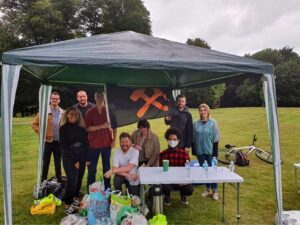
While attacking the SNP for its record on drug addiction and education in Scotland, Labour in Wales has presided over the highest child-poverty rate in the UK, a rapidly failing NHS (with worse A&E waiting times than England) and the highest levels of poverty in the UK. Indeed, the highest levels in most of Western Europe.
We are at a breaking point, exacerbated by Covid, in which a rupture is inevitable. It was only in the recent week that is was reported Wales would soon be facing it’s ‘worst food crisis since the Second World War’.
We have a choice in Wales. We can roll over, fully embrace the death-grip of an increasingly authoritarian and reactionary English state, and cease to be as a nation. Or, we can fight to liberate the Welsh working-class from the grips of not only English capital, but the entire rotten system itself. We believe that an independent, socialist Welsh republic would strike such a bitter blow to the imperialist bloc, that it would be hard to fathom the new era it would undeniably create.
What similarities do you see between the Irish struggle and the Welsh struggle?
The similarities we see in our struggles is that we are both trying to resist British imperialism and neo-colonialism (Ireland as a victim and Wales as a benefactor), and that we both are trying to preserve and embrace a culture and language that for centuries the British state has tried to erase systematically (the flooding of Tryweryn, the Welsh Not, the bitter Miner’s Strike, the Tonypandy Riots, etc)
We take the principles set out by Connolly and apply them to Wales: that it is not enough to simply erase the British state aesthetically, but to deconstruct in its totality the oppressive capitalistic apparatus that is used to oppress the working-classes in Wales. We look at the conditions laid out by Connolly in “What is a Free nation?” and come to the conclusion that we are not free, and thus our freedom must be fought for in that socialist republican tradition.
What advice would you have for the CYM?
When the WUN started out as a Socialist News Service in South Wales, we arranged an interview with former General Secretary of the CYM, Alexander Homits.
The advice the CYM provided us, without any exaggeration, spurred us into re-structuring into an actual organization, leading to where we are now.
The advice was to “do, do, do”. It’s only through on the ground work in our communities, engaging directly with our class, can we ever even begin to achieve our goals. Education is important – extremely so, but it doesn’t mean anything without actual action.
As Socialists, our job is to agitate, to educate, and to organise. For any good that social media or “online activism” may do, it’s only on the ground can the real work begin.
Che Guevara said that to be a revolutionary is to be guided by a deep sense of love for people, and that’s something we try and live by. When we do our work, we aim to leave our community a better place, whether it’s through free-food events, or litter picks.
Socialism won’t come from us telling others why it’s necessary, but through us showing them.
We would also stress that you don’t need massive numbers to do the work. The WUN started off as our founding Chair litter-picking by himself.
Three years later, we are in the position of being interviewed by yourselves!
With passion, and a little willingness to get down and dirty, you’d be amazed at what can be achieved.


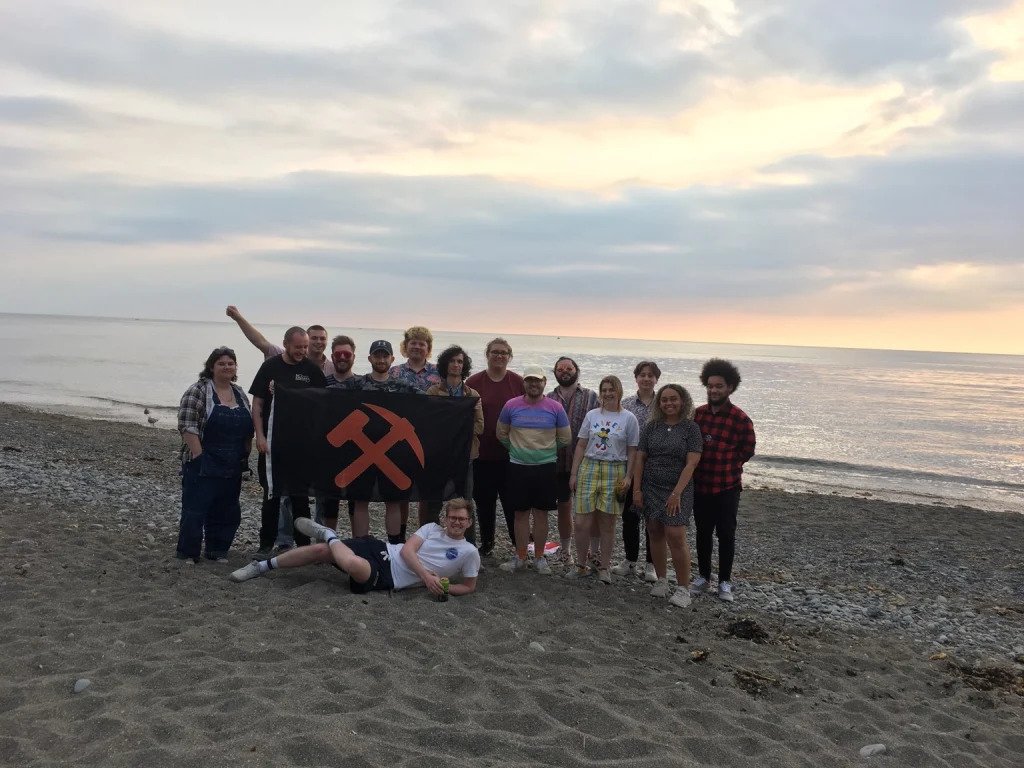
that line on “do, do, do” and about starting work with a single person were inspiring. not to get all great man theory or anything but it is really impressive.